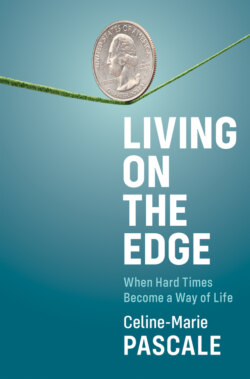Читать книгу Living on the Edge - Celine-Marie Pascale - Страница 7
Acknowledgments
ОглавлениеResearching and writing Living on the Edge was both harder and more rewarding than I ever could have imagined. As many readers will recognize, in challenging times the smallest amount of support has enormous impact, and so it has been for me in the years of writing this book. My efforts have been sustained by the inspiring work of others, small acts of kindness from complete strangers, and the sustenance of colleagues, friends, and family.
My first thanks must go to all of the people in struggling communities who talked with me both casually and in formal interviews. In the interviews people willingly risked a great deal. They trusted me with the details of their lives – often personal details for which they have been shamed. They took such risks because they believed in the importance of the project and they trusted my ability to see the dignity in their struggles, to use their own words in ways they had intended, and to protect their privacy. I am indebted to each of them and I hope this book repays their trust a hundred times over.
The College of Arts & Sciences at American University provided both a research fund and a Mellon Grant to support my research; this was a significant help in getting the project off of the ground. I owe special thanks to my colleague Angie Luvara for inspired and inspiring conversations about Appalachia and the people who live there. Steven Jones helped me to kick-off the project by piloting an interview with me. Riham Amin offered insights as an initial reader on several chapters, as did Chris Guilfry and Allan S. Pollock. Flora Ingenhousz provided invaluable support for the early stages of the project. Throughout the initial framing of the book, Josephine Ross was an invaluable sounding board and a generous reader. I also want to acknowledge the generosity of my colleagues Cynthia Miller-Idriss, Ernesto Castañeda, and Rachel Louise Snyder for their helpful advice. Carlos Barillo, Marie Garcia, and Mike Mullen – thank you for all of the ways large and small that you have supported me and my family through this project and through far more.
Over the years Bandana Purkayastha has threaded through my life as a cherished colleague. Bandana and I first crossed paths at a professional sociology meeting more than twenty years ago. At her invitation I presented a preliminary paper based on research for this book at the Eastern Sociological Society Presidential Panel in 2019. It was there that Bandana introduced me to Jonathan Skerrett, an editor at Polity, with whom she was working. From the start, Jonathan’s confidence in this book was matched by his editorial acumen. It was an opportunity of a lifetime to work with Jonathan, his thoughtful suggestions and guidance have shaped every chapter. I owe great thanks to the entire Polity team, from the cover designer Rob Lock, to Rachel Moore for keeping the trains on time, to Tim Clark for spectacular editing, and to John Thompson for his work behind the scenes. Each member of the Polity team brought their areas of expertise to bear on the manuscript to make Living on the Edge: When Hard Times Become A Way of Life the best possible version of itself. I owe gratitude as well to the five external reviewers who offered anonymous feedback on the manuscript. Their feedback was equally thoughtful and clarifying.
During the years that I spent researching and writing Living on the Edge, my spouse, Mercedes Santos, carried the heaviest burdens of my travel and writing time. Still, she was the one who kept the wheels on the bus and an espresso at easy reach. Her willingness to read everything, regardless of how much sense it made, or how many times she had seen it, was an incredible act of generosity. I am grateful for our many years together and our unending journey of “beginner’s mind.” There are not enough words. Thank goodness.
